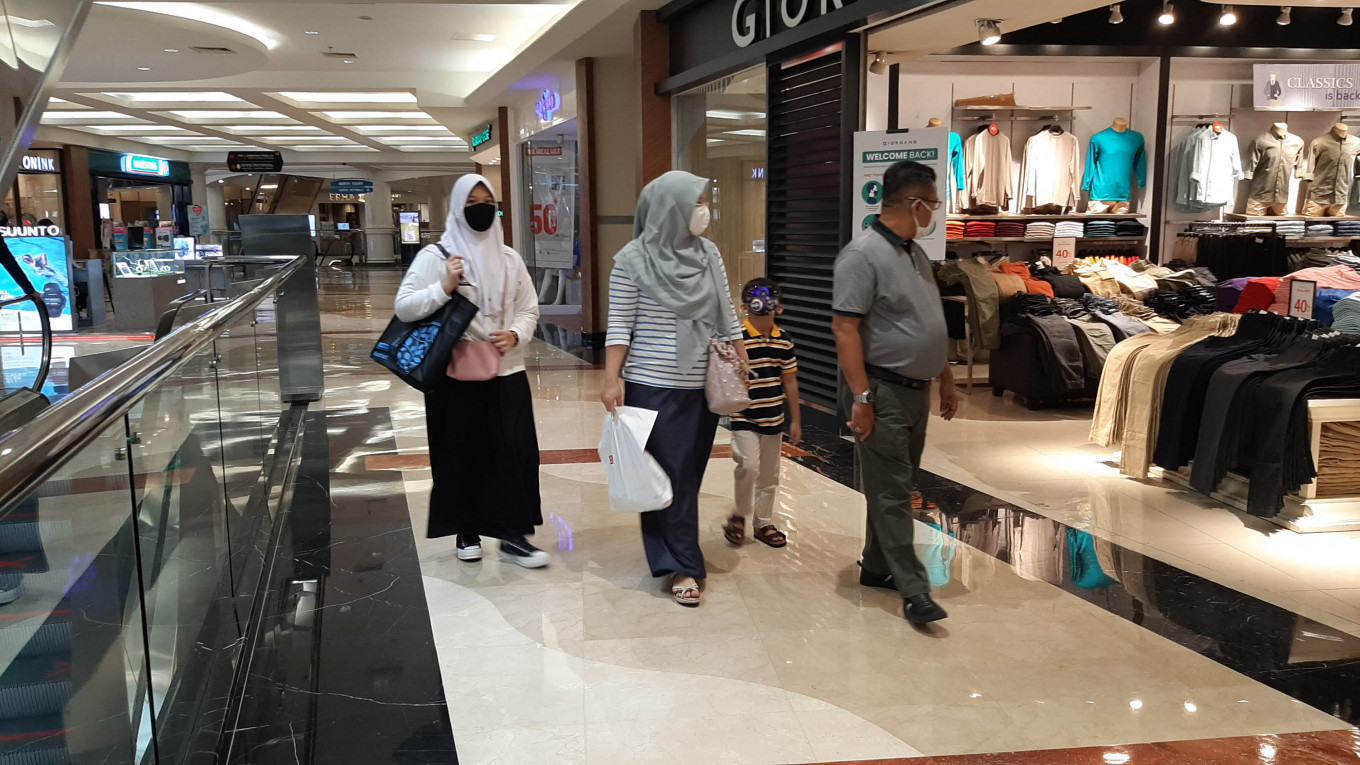Popular Reads
Top Results
Can't find what you're looking for?
View all search resultsPopular Reads
Top Results
Can't find what you're looking for?
View all search resultsIndonesia’s retail sales contract further but show signs of improvement
Retail sales in Indonesia fell 17.1 percent year-on-year (yoy) in June, marking a slight improvement when compared with an even greater contraction recorded in May, a Bank Indonesia survey shows.
Change text size
Gift Premium Articles
to Anyone
 Not a solution: A family window-shops in late June while wearing masks at a mall in South Jakarta. Shopping centers started reopening in early June under the eased COVID-19 restrictions for the so-called new normal phase, but consumers remain concerned about infections and the economy. (JP/Arief Suhardiman)
Not a solution: A family window-shops in late June while wearing masks at a mall in South Jakarta. Shopping centers started reopening in early June under the eased COVID-19 restrictions for the so-called new normal phase, but consumers remain concerned about infections and the economy. (JP/Arief Suhardiman)
R
etail sales in Indonesia fell 17.1 percent year-on-year (yoy) in June, marking a slight improvement when compared with an even greater contraction recorded in May, as the economy started to recover after three months of partial lockdown to curb the coronavirus spread, a Bank Indonesia (BI) survey released on Tuesday shows.
In May, retail sales were down 20.6 percent yoy.
The government began lifting large-scale social restrictions (PSBB) in early June to rescue the virus-battered economy.
Compared to the preceding month, June saw improvements in the purchase of vehicle fuels, food, beverages and tobacco, as well as information services, among other categories, according to the survey.
“The improved retail sales performance was driven by reopening of retail stores during the shift from the PSBB [and to the adoption of] new habits,” the central bank said in the survey.
“The retail sales performance is expected to improve further in July despite still being in a contraction phase.”
The central bank estimates that sales in July were down 12.3 percent yoy, which would be a further decline in the severity of the contraction, thanks to higher sales of food, beverage and tobacco as well as household equipment.
The government has been campaigning heavily for “adapting to new habits”, asking people to wear masks and wash their hands regularly, among other measures, to save the economy, which is expected to contract by 0.4 percent this year or grow by only 1 percent.
Indonesia booked its first GDP decline in two decades as the economy shrank 5.32 percent in the second quarter this year as all components of economic activity fell.
The retail sales index in the second quarter contracted 18.2 percent yoy, compared to a contraction of 1.9 percent in this year’s first quarter and 4.2 percent growth in the second quarter of last year, the central bank said.
According to the survey, retail sales are set to pick up in the next three to six months following the reopening of the economy, which is expected to boost the public’s purchasing power.
“The retail sales performance hit rock bottom in May, showing early signs of recovery in consumption [in June], albeit at a very slow pace,” Mirae Asset Sekuritas Indonesia economist Anthony Kevin told The Jakarta Post. “We continue to expect a U-shaped economic recovery.”
Anthony said the demand and supply sides of the economy had yet to pick up significantly after the slump recorded in the second quarter. He said he expected the economy to shrink by 1.8 percent yoy in the third quarter as the recovery remained slow amid rising coronavirus cases.
“We are not confident about economic growth should government spending remain weak throughout the year. Therefore, the key is to expedite budget spending,” he went on to say.
The government has earmarked Rp 695.2 trillion (US$47.5 billion) for boosting the economy and stimulating consumer demand, but many economists warn it may not be effective if spending remains slow.
As of Aug. 6, the government had only spent Rp 151.25 trillion of the stimulus budget, five months after the first outbreak in March, Finance Ministry data show.
Finance Minister Sri Mulyani Indrawati attributed the slow spending to complicated bureaucracy and a lack of citizens’ data, among other reasons.









